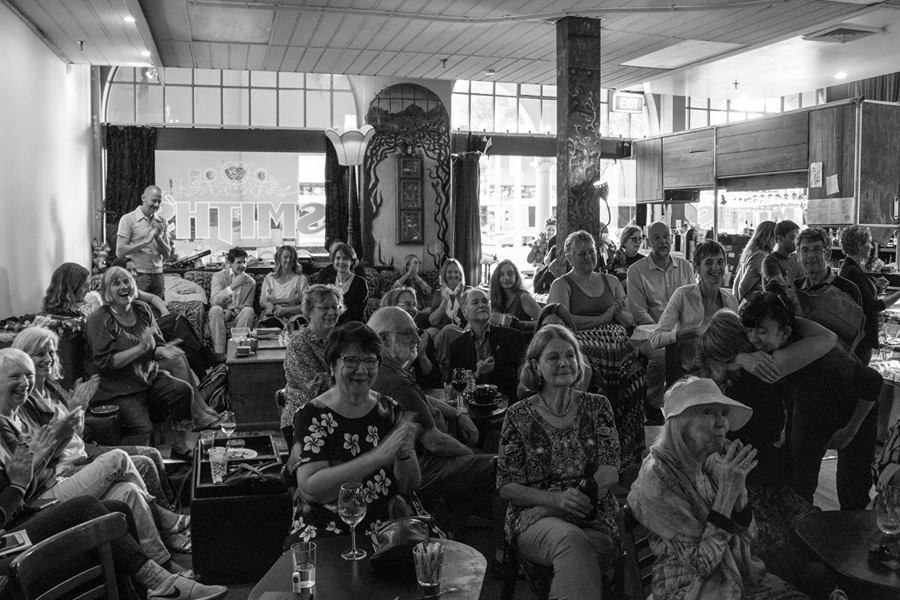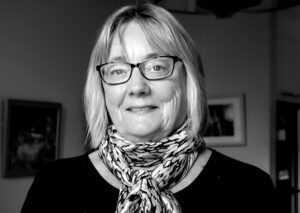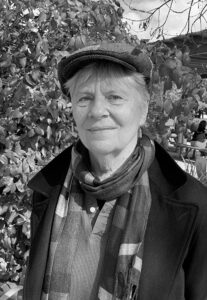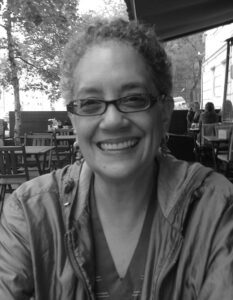
Not Very Quiet – a Q&A with the journal’s founding editors
Not Very Quiet was an online journal for women’s poetry that published writing from 2017 to 2021. Its editors and contributors were (and still are) actively present in the Canberra writing community.
We interviewed the three founding editors of Not Very Quiet – Moya Pacey, Sandra Renew, and Tikka Wilson – to learn more about their experiences of editing poetry, their reflections on Not Very Quiet’s impact, and their perspectives on the value of poetry in the modern world.
What made NVQ different?
Moya Pacey: The online journal Not Very Quiet was for women’s poetry only and used a blind peer selection process to focus on the poem not the poet. We invited a Guest Editor for five of the eight issues. Each issue had a specific provocation. These were chosen to be consonant with the times we were living through. The first provocation was a direct quote from Gloria Steinem who spoke at the Women’s March on Washington after Donald Trump’s election as President of the USA in 2016.
Sandra Renew: We published women’s writing, tapping into a world of words that was overwhelmingly publishing what men wanted to say. So we had a body of potential to work from that women poets are keen to have out in the world. We provided a forum from which women’s writing could be seen and heard. So many of the gains in equality and fairness for women are fragile, can be rolled back in moments. Women are writing about their experience of a gendered world, about issues and concerns, beauty and tragedy and outrage, and we were able to give a form and place for that.
Tikka Wilson: Not Very Quiet’s personality as a publication was curious, diverse, and eclectic. It published a wide range of women poets who were keen to bear witness to and put feminist women’s perspectives on the record through their poetry. Each issue embodied a wide range of forms, interests, experiences, and physical and subjective locations.
From your perspective, what is the value of poetry? Why was it valuable to start your own poetry journal?
TW: Poetry is an inclusive genre. It is particularly accessible to people who want to begin to express themselves through writing, at any age and stage of life. Not Very Quiet sought and published a number of emerging and experimenting poets. Starting our own journal empowered us to make the selections on our own terms without reference to the canon which continues to be dominated by dead white men. That said, canonical gatekeeping lurks inside everyone’s head and has to be continually challenged. Our ‘resistant gatekeeping’ of course came with its own set of issues – Not Very Quiet always received many, many more submissions than we could possibly include.
SR: Toni Morrison wrote, with an eye to the various broken-nesses of the world, past and present:
“This is precisely the time when artists go to work. There is no time for despair, no place for self-pity, no need for silence, no room for fear. We speak, we write we do language. That is how civilisations heal.”
Words in poetry are political. Every poem is political, either in the actual words of protest or in the positioning of the writer and the reader in the world and the discourses in which they live. I write poetry to express the purpose of poets in exploring the complexities and possibilities of the human condition. And to give expression to the social conscience of the community. Poetry is a specific way of knowing, of crystallising the dissonance in the dominant discourses in a way which is accessible to anyone who is driven by revolution.
Not Very Quiet allowed for women’s poetry to be active, exploratory and present in the unrest and dissonance of gender debates in our times.
MP: Poetry speaks for women in a multitude of voices. It articulates different experiences that need to be heard and recorded. At its best it uses heightened expression – the best words in the best order. Poetry adds to our experience vicariously and encourages a sense of empathy. Have a look at the different issues and read what women say about their lives and the lives of others. The issues are now archived and are an important repository of the female poet’s narrative from the second and third decades of the twenty-first century. One of our Not Very Quiet poets Jena Woodhouse said of the journal: ‘It is a brave and beautiful testimony to the talent and vitality of poetry by women in this country and beyond, and thanks to what has been achieved, there’s no going back.’
What did you learn as editors? And did your tastes change, or diverge from one another’s?
TW: While I had editorial experience on a number of different editorial boards, it was great fun to be able develop the guidelines and processes that would result in the diversity we sought. It became apparent very quickly that the founding editors and guest editors had very different tastes, preferences and approaches to the selection process. We developed a blind selection process that specifically eschewed any effort to arrive at consensus. Rather, we chose to value and validate differences by publishing an equal number of each editor’s selections. It required a lot of trust – while there was some overlap, there was also a lot of divergence. I think our diversity-focused process enabled a diversity-focused journal.
MP: We learned a lot about poetry and about poets. We invested a lot of our time in setting up a process that elicited strong, vibrant innovative work from as wide a range of women poets as possible. Generosity is something I take away from Not Very Quiet. The generosity of the poets who sent us their best work and continued to send poems throughout the life of the journal. The generosity of the Guest Editors: Anita Patel, Lisa Brockwell, Kerrie Nelson, Tricia Dearborn and Anne Casey and Tikka Wilson our Production Manager was outstanding.
As editors our tastes were always divergent although via the blind selection process, we agreed that a good poem always stands out and a great poem cannot be ignored.
SR: As poets ourselves, Moya and I write very different poetry, and appreciate a quite different range of styles, forms and content. So coming from the different parts of the poetry spectrum, and through a blind submission process, we were able to incorporate an extremely rich range of work into Not Very Quiet.
Our Guest Editors were selected to bring other views and perspectives, so we were never going to be selecting just one type of poem. While we started each Issue selecting work that we all agreed on, we completed each round by allocating an equal number of choices to each editor, and these choices were included without debate to give each of our own perspectives space in the Issue.
Through this rigorous and angsty process I really had to look at the full range of work each of the editors was including. And I found some pieces that I would not have really appreciated before.
What gave you the greatest unexpected joy as an editor over the course of the journal’s existence?
SR: Positive feedback from poets and readers was overwhelming over the years we published. It was very heartening to have our on-line and printed Anthology appreciated to that extent. And, knowing our publisher Shane Strange at Recent Work Press wanted to go to a hard copy for the Anthology was a great boost.
It was a joy every time Tikka, our Production Manager, gave us the link to look at the Issue we had just struggled over, and seeing it on-line in a beautiful format and presentation was a real thrill.
TW: Struggling to develop an approach to selection that embodied our politics of diversity, testing it, iterating, and finding that it worked! I was responsible for production: communication, design, and typesetting. I really enjoyed interacting with the poets on the editing and presentation of their work. Although we were a bit limited by the website software, mostly it worked. I also very much enjoyed working with our guest editors – each brought a unique sensibility to Not Very Quiet. Finally, I was also intrigued and delighted by the differences and similarities between editing creative writing vs editing non-fiction ‘authoritative’ writing.
MP: The nationwide and beyond network of Not Very Quiet women poets that we grew over the course of eight issues was a joy. We also curated a monthly women’s poetry evening at Smiths Alternative in Canberra. It was a safe inclusive space for women to come along and read a poem at the open mic. Some emerging women poets read their first poem in that space and have gone on to publish widely and even had first and second collections published. We also launched each issue there and these were always memorable, celebratory events for women’s poetry.
What do you hope readers and contributors take away from NVQ?
SR: That good poetry makes an enormous contribution to the discourse of the political in relation to gender. That making space for women’s writing is important in the scheme of things.
And, I’d hope everyone keeps going back to the online Issues for a good read and gets hold of the hard copy Anthology from Recent Work Press to share around.
TW: I hope they appreciate that ‘women’ is a category of human that cannot be pinned down or defined.
MP: Different poets and readers will take away different experiences. We began the journal with the hope that it would provide a space for women’s voices to be heard and valued by as wide an audience as possible. We did hear familiar voices, but we also heard from poets we hadn’t heard from before. Women from the margins. Women of colour. Women from diverse backgrounds. Distinctive voices. Women’s poetry is richer and more inclusive as a result of the opportunity Not Very Quiet provided for women’s poetry.
The door is open for others to follow. My hope is that it will stay open.
Moya Pacey’s third collection, Doggerland (Recent Work Press 2020), was highly commended in 2021 ACT Book of the Year Awards.
She is a founding editor of the women’s online journal Not Very Quiet and was awarded a Canberra Critics’ Circle Award, with Sandra Renew, in 2019 for her influential work in exposing women’s poetry to view via the journal. In October 2018, she was the Poet in Residence at the Elizabeth Bishop House in Great Village, Nova Scotia, Canada. She has an MA in Creative and Life Writing from Goldsmiths College, University of London.
Sandra Renew’s new LGBTIQAAA+ poetry is in Apostles of Anarchy, Recent Work Press 2023 and
The Ruby Red’s Affair, a prose/poetry narrative exploded moment, Ginninderra Press 2022.
Apostles of Anarchy is a linked series of hybrid pieces countering a personal newspaper archive in Queensland from 1978 to ’83, a decade of political protest.
Tikka Wilson worked in a variety of production, design and editorial roles in both printed and online publishing. Publishers included The Australian National University, National Archives, National Museum, United Nations and, when she first arrived in Australia, The Bega District News. She enjoys gardening, podcasts, AI and poodles.



